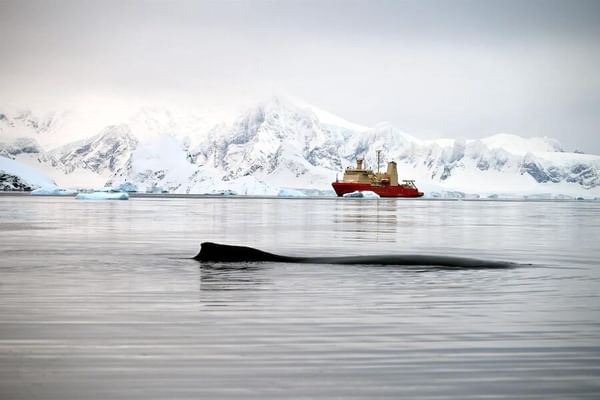- Undergraduate
Bachelor's Degrees
Bachelor of ArtsBachelor of EngineeringDual-Degree ProgramUndergraduate AdmissionsUndergraduate Experience
- Graduate
Graduate Experience
- Research
- Entrepreneurship
- Community
- About
-
Search
All Thayer News


Study Shows Sea-Level Rise for Future Generations Is Highly Dependent on Emission Levels
Sep 04, 2024 | by Catha Mayor
A multi-institutional study, led by Dartmouth Engineering Professor Hélène Seroussi, extends scientists' predictions of how greenhouse gas emissions will likely affect sea-level rise beyond the twenty‐first century. Published in Earth's Future, the study is the first to combine data from 16 different ice sheet models and shows that, with continued high emissions, Antarctic's contribution to sea‐level rise increases rapidly from 2100 to 2300.

The research vessel Nathaniel B. Palmer along the Antarctic Peninsula. (Photo by Dan Costa, courtesy of NSF/USAP; Creative Commons CC BY-NC-ND 4.0)
"When you talk to policymakers and stakeholders about sea-level rise, they mostly focus on what will happen up until 2100. There are very few studies beyond that," says Seroussi. "Our study puts together 16 models to provide the long-term projections that have been lacking.
"The results show that pushing beyond 2100, the gap between the low emission and high emission scenarios grows quickly, and differences in long-term impact for the most susceptible regions become exaggerated."
Nearly a quarter billion people currently live within one metre of high tide lines. The new combined model predicts that under a high emissions scenario, Antarctica could add up to 170 centimeters to sea levels by the year 2200.
"Ice mass losses from low- and high-emission scenarios are relatively similar for this century," says Petra Langebroek from the iC3 Polar Research Hub in Tromsø and NORCE and Bjerknes Centre for Climate Research (BCCR) in Bergen, who contributed to the study.
"However, the difference between scenarios grows rapidly after the year 2100. This underscores the importance of reducing emissions now to safeguard the long-term stability of the Antarctic ice sheet, and protect our descendants from the consequences of catastrophic sea level rise."

Hélène Seroussi, associate professor of engineering and the study's lead author. (Photo by Eli Burakian '00)
The team, including Dartmouth engineering student Jake Twarog '24 and Mathieu Morlighem, professor of earth sciences, also found that although the time when these glaciers start retreating varies depending on the ice flow model, the speed at which they experience large retreats is consistent among the models once these retreats begin.
"Several basins in West Antarctica could experience a complete collapse before 2200 and all models agree that once these large changes are initiated, nothing can stop them or slow them down," says Seroussi. "The exact timing of such collapses remains unknown and depends on future greenhouse gas emissions, so we need to respond quickly enough to reduce emissions before major basins of Antarctica are lost.
"We're learning from the community of scientists what is going to happen," Seroussi adds. "This collaboration means we have a better, more robust assessment of the uncertainty, and we can see where our models agree and where they disagree so that we know where to focus our future research."
For contacts and other media information visit our Media Resources page.
